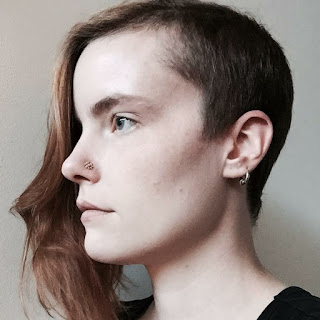Isobel O'Hare is a poet and essayist who was born in Chicago but did most of her growing up in Ireland. She is the author of Wild Materials from Zoo Cake Press. Her writing can be found in The Account, Dirty Chai Magazine, HOUND, FORTH Magazine, Numero Cinq, The Doctor T.J. Eckleburg Review, and Cease, Cows, among other publications. She received her MFA from the Vermont College of Fine Arts, and she was recently awarded a Helene Wurlitzer Fellowship. She lives in Oakland, California.
DS: Why do you write poetry?
IO: I started
writing poetry when I was a kid because I didn't have anyone to talk to about a
lot of very traumatic things that were happening in my life. I grew up in
various abusive environments where I often felt isolated and unheard. I was
already writing short stories about fantastical things like a world-traveling
young girl and her pet chimpanzee, a couple of time-traveling elementary school
students, as well as some retellings of classic horror stories. Poetry came to
me specifically as a form of self-care when I needed someone to talk to and
nobody was there but paper and pens.
These
days I write poetry for a few different reasons. Self-care is still definitely
one of them, but I don't tend to share the things that I write for my own
therapeutic purposes, as they tend to be unfinished thoughts that are suspended
in liquid anger. These are the pieces I have to write in order to get to a
truer place.
Poetry can take
the form of magic spells when I start to feel that some form of transformation
is needed in me but I don't yet know how to achieve it. I usually end up
realizing that the poem wasn't the entire spell itself but just one component
of it. Maybe the eye of newt.
I also write
poetry in order to translate the world as I see it into something that can be
communicated to another person. It is often difficult for me to communicate my
experiences of the world via spoken language, and sometimes prose seems too
direct in an explicit sense. Poetry offers a form of communication that is more
intuitive, and thus paradoxically more direct than saying literally what one is
thinking or feeling. It creates a conduit for two minds to read one another
without speaking.
DS: What do you
hope to find in poems written by other people?
IO: That same
conduit. Whenever I connect to a piece in this way, I get so excited. It makes
me want to write more myself, to continue communicating in this language that
exists in a universe parallel to our own.
DS: Describe your
works in progress.
IO: I am (very) slowly
putting together a full-length poetry manuscript. Some of the pieces from Wild
Materials will be included, as well as some pieces that didn't make it into
Wild Materials, but it will mostly be new poems.
I am also
working on a long-form piece on PTSD that connects personal narrative with
scientific research out of the desire to further mainstream understanding of
the disorder. It is becoming increasingly important that PTSD is understood as
a major health concern in the United States.
DS: What are your
hopes for the future of poetry?
IO: With all of the
recent scandals in the poetry world, my hope is that we will continue to
communicate openly with one another about race, class, gender, disability, and
other social issues in order to increase accessibility for all poets who are
part of our community. It is consistently distressing to wake up to news of the
latest scandals on a weekly basis, but the fact that we can openly recognize
and talk about these events as problematic is promising. Social media has given
access to so many people who were previously cut off from such conversations,
and I look forward to its continued use as a tool for discussion and increased
accessibility.
Some of Isobel's Poems Online:

